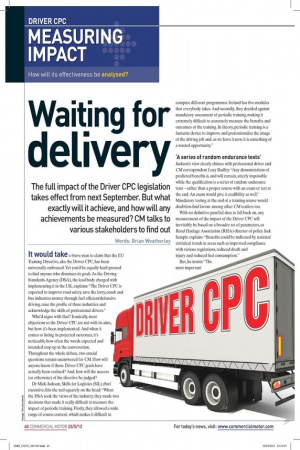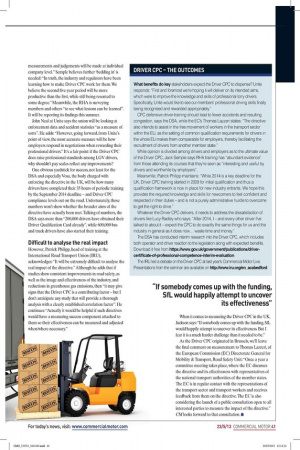Waiting for deliver The full impact of the Driver CPC
Page 33

Page 34

If you've noticed an error in this article please click here to report it so we can fix it.
legislation takes effect from next September. But what exactly will it achieve, and how will any achievements be measured? CM talks to various stakeholders to find out Words: Brian Weatherley It would take a brave man to claim that the EU Training Directive, aka the Driver CPC, has been universally embraced. Yet you'd be equally hard-pressed to find anyone who dismisses its goals. As the Driving Standards Agency (DSA), the lead body charged with implementing it in the UK, explains: "The Driver CPC is expected to improve road safety, save the lorry, coach and bus industries money through fuel efficient/defensive driving, raise the profile of those industries and acknowledge the skills of professional drivers."
Who'd argue with that? Ironically, most objections to the Driver CPC are not with its aims, but how it's been implemented. And when it comes to listing its projected outcomes, it's noticeable how often the words expected and intended crop up in the conversation. Throughout the whole debate, two crucial questions remain unanswered for CM How will anyone know if those Driver CPC goals have actually been realised? And, how will the success (or otherwise) of the directive be judged?
Dr Mick Jackson, Skills for Logistics (Sit) chief executive, hits the nail squarely on the head: "When the DSA took the views of the industry, they made two decisions that made it really difficult to measure the impact of periodic training. Firstly, they allowed a wide range of course content, which makes it difficult to compare different programmes. Ireland has five modules that everybody takes. And secondly, they decided against mandatory assessment of periodic training, making it extremely difficult to accurately measure the benefits and outcomes of the training. In theory, periodic training is a fantastic device to improve and professionalise the image of the driving job and, as we have it now, it is something of a wasted opportunity."
'A series of random endurance tests' Jackson's view clearly chimes with professional driver and CM correspondent Lucy Radley: "Any demonstration of predicted benefits is, and will remain, utterly impossible while the qualification is a series of random endurance tests — rather than a proper course with an exam or test at the end. An exam would give it credibility as well." Mandatory testing at the end of a training course would doubtless find favour among other CM readers too.
With no definitive pass/fail data to fall back on, any measurement of the impact of the Driver CPC will inevitably be based on a broader set of parameters, as Road Haulage Association (RHA) director of policy Jack Semple explains: "Benefits could be indicated by national statistical trends in areas such as improved compliance with various regulations, reduced death and injury and reduced fuel consumption."
But, he insists: "The most important measurements and judgements will be made at individual company level." Semple believes further 'bedding in' is needed: "In truth, the industry and regulators have been learning how to make Driver CPC work for them. We believe the second five-year period will be more productive than the first, while still being resented to some degree." Meanwhile, the RHA is surveying members and others "to see what lessons can be learned". It will be reporting its findings this summer.
John Neal at Unite says the union will be looking at enforcement data and accident statistics "as a measure of sorts". He adds: "However, going forward, from Unite's point of view, the most accurate measure will be how employers respond in negotiations when rewarding their professional drivers." It's a fair point: if the Driver CPC does raise professional standards among LGV drivers, why shouldn't pay scales reflect any improvements?
One obvious yardstick for success, not least for the DSA and especially Vosa, the body charged with enforcing the directive in the UK, will be how many drivers have completed their 35 hours of periodic training by the September 2014 deadline — and Driver CPC compliance levels out on the road. Unfortunately, those numbers won't show whether the broader aims of the directive have actually been met. Talking of numbers, the DSA says more than "200,000 drivers have obtained their Driver Qualification Card already", while 600,000 bus and truck drivers have also started their training.
Difficult to analyse the real impact However, Patrick Philipp, head of training at the International Road Transport Union (IRU), acknowledges: "It will be extremely difficult to analyse the real impact of the directive." Although he adds that if studies show consistent improvements in road safety, as well as the image and effectiveness of the industry, and reductions in greenhouse gas emissions, then "it may give signs that the Driver CPC is a contributing factor — but I don't anticipate any study that will provide a thorough analysis with a clearly established correlation factor". He continues: "Actually it would be helpful if such directives would have a measuring success component attached to them so their effectiveness can be measured and adjusted when/where necessary." When it comes to measuring the Driver CPC in the UK, Jackson says: "If somebody comes up with the funding, Sit would happily attempt to uncover its effectiveness. But I fear it is a much harder challenge than it needed to be."
As the Driver CPC originated in Brussels, we'll leave the final comment on measurement to Thomas Lazzeri, of the European Commission (EC) Directorate General for Mobility & Transport, Road Safety Unit: "Once a year a committee meeting takes place, where the EC discusses the directive and its effectiveness with representatives of the national transport authorities of the member states. The EC is in regular contact with the representations of the transport sector and transport workers and receives feedback from them on the directive. The EC is also considering the launch of a public consultation open to all interested parties to measure the impact of the directive." CM looks forward to that consultation. • What benefits do key stakeholders expect the Driver CPC to dispense? Unite responds: "First and foremost we're hoping it will deliver on its intended aims, which were to improve the knowledge and skills of professional lorry drivers. Specifically, Unite would like to see our members' professional driving skills finally being recognised and rewarded appropriately."
CPC defensive driver-training should lead to fewer accidents and resulting congestion, says the DSA, while the EC's Thomas Lazzeri states: "The directive also intends to assist in the free movement of workers in the transport sector within the EU, as the setting of common qualification requirements for drivers in the whole EU makes them comparable for employers, thereby facilitating the recruitment of drivers from another member state."
While opinion is divided among drivers and employers as to the ultimate value of the Driver CPC, Jack Semple says RHA training has "abundant evidence" from those attending its courses that they're seen as "interesting and useful by drivers and worthwhile by employers".
Meanwhile, Patrick Philipp maintains: "While 2014 is a key deadline for the UK, Driver CPC training started in 2009 for initial qualification and thus a qualification framework is now in place for new industry entrants. We hope this provides the required knowledge and skills for newcomers to feel confident and respected in their duties — and is not a purely administrative hurdle to overcome to get the right to drive."
Whatever the Driver CPC delivers, it needs to address the dissatisfaction of drivers like Lucy Radley who says: "After 2014, I — and every other driver I've talked to about it — expect the CPC to do exactly the same things for us and the industry in general as it does now... waste time and money."
The DSA has conducted interim research into the Driver CPC, which includes both operator and driver reaction to the legislation along with expected benefits. Download it free from https://www.gov.uk/government/publications/drivercertificate-of-professional-competence-interim-evaluation The IRU led a debate on the Driver CPC at last year's Commercial Motor Live. Presentations from the seminar are available on http://www.ku.orgten acabedford









































